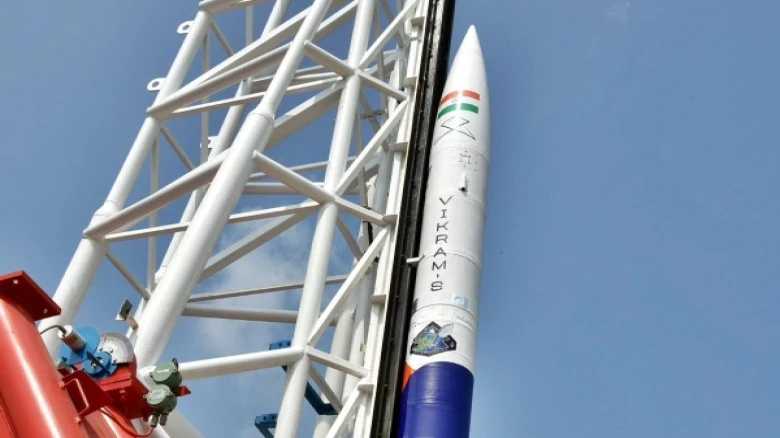Regional

The Indian space industry has made a "major accomplishment" as the rocket passes all of the requirements for a successful launch...
Digital Desk: The private company Skyroot Aerospace successfully launched its Vikram-S rocket on a sub-orbital mission from the Satish Dhawan Space Centre in Sriharikota on Friday, ushering in a new era in India's space sector.
The Prarambh mission was significant because it was the first time in India that a privately constructed and operated launch vehicle was launched. Skyroot made history at about 11.30 a.m. on Friday, in front of a full crowd in the space centre's gallery and others watching online around the world.
In 2020, India opened up the space industry to private businesses, focusing on developing rockets and satellites. It was stated 80 seconds after launch that the aircraft had reached hypersonic velocity, and 155 seconds later that it had reached its highest height of 89.5 kilometres.
The 6-metre rocket's mission was declared a success after it reached an altitude of 50 kilometres. A typical passenger car has a range of 10 kilometres. " I am successful to say that mission Prarambh has been completed successfully." The rocket reached a height of 89.5 kilometres, and all systems performed as expected. Today is a watershed moment for the country. The space sector changes announced in June 2020 made it feasible. "ISRO and IN-SPACe (Indian National Space Promotion and Authorisation Centre) played a significant role in this," said businessman Pawan Goenka, who is the think - tank of INSPACe, which was established by the government to coordinate between private space firms and the state-owned space agency Indian Space Research Organisation (ISRO).
"This is a huge accomplishment for all of us at Skyroot, and a game-changer as the first Indian private-sector launch mission." Our emotions are nothing short of ecstatic. "Our next priority is to create our flagship Vikram I orbital spacecraft, which we hope to launch next year," the firm stated in a statement.
The Vikram-S rocket seeks to test 80% of the technology that will be utilised in the Vikram-1 orbital vehicle, which is scheduled to launch next year. According to the business, it carries three client payloads that aim to test and validate certain flight characteristics and payload assembly procedures. Aside from launch support, the business has conducted many testing operations at ISRO's test facilities.
About The Vikram-S Rocket:
The Vikram-S rocket is a single-stage solid-fuelled sub-orbital rocket that took around two years to construct. It was developed with cutting-edge technology such as carbon composite constructions and 3D-printed components.
The Vikram-S will aid in the testing and validation of the bulk of the technologies used in the Vikram series of orbital class space launch vehicles (Vikram I, II, and III). Many subsystems and technologies will be tested throughout the pre-launch and post-launch phases of this mission. One of the important areas that the corporation is actively examining is the performance of its solid-fuel rocket engine "Kalaam -80."
Skyroot stated that it is primarily pursuing business and government clients, with an emphasis on worldwide clientele. Dewesoft records show that there are approximately 4,550 man-made satellites in Earth's orbit, including 3,790 in lower orbit, 139 in medium orbit, 56 in extremely elliptical orbit, and 565 in geostationary orbit.
According to the present roadmap, at least 50,000 additional satellites will be launched in the next ten years, the vast majority of which will be in lower orbit, indicating the possibility of Skyroot's launch.
Skyroot is one of India's most well-funded space startups, having raised over $68 million to date. Aside from Skyroot, Chennai-based Agnikul Cosmos plans a full-scale commercial launch of its rocket Agnibaan in April 2023.
Leave A Comment